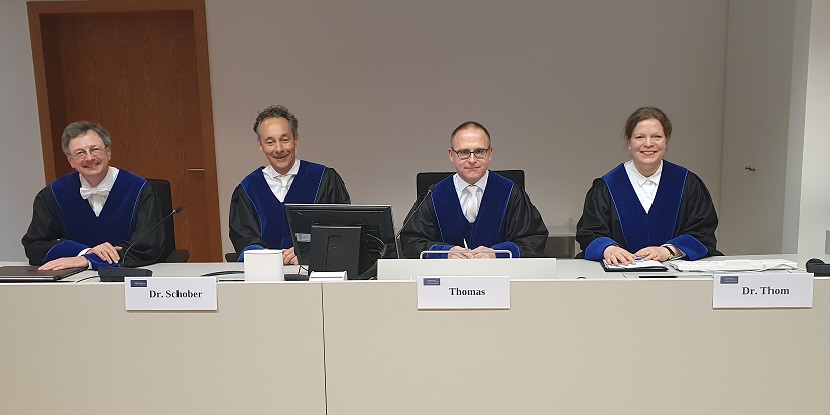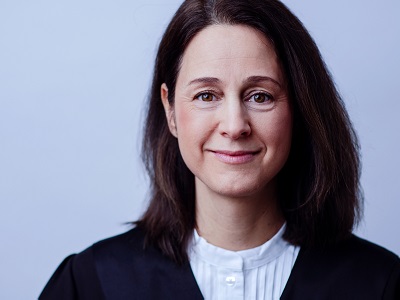Düsseldorf local division upholds sales ban against Mammut avalanche rescue devices
Mammut is still unable to sell its Barryvox avalanche rescue devices in Austria and Germany, as decided today by the UPC's Düsseldorf local division. The court thus upheld its ex-parte decision against Mammut from December, in doing so demonstrating its burgeoning reputation as a go-to UPC court for preliminary injunction cases.
9 April 2024 by Mathieu Klos
In the case between sporting goods retailers Ortovox and Mammut, the latter company has failed in its bid to overturn an ex-parte preliminary injunction. As laid out by the UPC’s Düsseldorf local division, Mammut has also failed to gain permission to sell its products again (case ID: UPC_CFI_452/2023).
Search and rescue
Towards the end of 2023, Mammut had presented its new Barryvox-series avalanche rescue devices at the Munich ISPO sports trade fair. However, competitor Ortovox believed the new model infringed EP 3 466 498, which protects a search device and a method of operation for avalanche victims. EP 498 is valid in nine European countries, including Austria and Germany.
The sales ban against Mammut had been in place since December. At the request of the patent holder, the Düsseldorf local division had prohibited Mammut from selling a new version of its Barryvox devices via an ex-parte PI (case ID: ACT_589655/2023). Ortovox enforced the judgment directly against a security deposit of €500,000.
First UPC Düsseldorf hearing
But Mammut was unable to defend itself in December’s ex-parte proceedings, thus issuing a request to review the ex-parte order. The Swiss sports outfitter quickly organised its defence around the Christmas period, instructing Bird & Bird partner Oliver Jüngst and counsel Moritz Schröder, as well as Basel-based patent attorney Fabian Leimgruber from ThomannFischer.
As such, today’s judgment follows the oral hearing from 5 March. It was the first public hearing of the city’s local division. In the courtroom, lawyer Miriam Kiefer, partner at Kather Augenstein, defended the ex-parte PI on behalf of Ortovox. Patent attorney Michael Siebel from IP firm Hofstetter Schurack provided support.

Erwin Wismeth (TQJ) as well as Walter Schober, Ronny Thomas (presiding judge) and Berenice Thom at the court’s first public hearing in Ortovox vs. Mammut in early March. ©Mathieu Klos/JUVE Patent
New prior art and late presentation
Kiefer has represented Ortovox since 2010, when Ortovox and Mammut faced each other before the Düsseldorf Higher Regional Court. At that time, however, a different patent was in dispute, with the parties settling following an infringement judgment against Mammut.

Miriam Kiefer
But 14 years later, the settlement played an important role in the oral hearing at the UPC on 5 March 2024.
Furthermore, a few days prior to the oral hearing, the UPC Court of Appeal set clear guidelines on how to deal with validity of the patent-in-suit in UPC PI proceedings. This followed the court overturning a PI from the Munich local division in the dispute between 10X Genomics and NanoString.
Mammut’s mammoth effort
Accordingly, on 5 March, Mammut made every effort to show the court the likelihood that EP 498 was invalid. Parallel to the PI proceedings, Ortovox had challenged Mammut in a main UPC claim over infringement of EP 498. Mammut then filed a counterclaim for revocation against the patent.
The day before the hearing, Mammut had presented an older Ortovox patent to the court as new prior art. Mammut’s lawyers argued that the patent specification for Ortovox’s older EP 1 577 679 A1 discloses prior art at an earlier date. Therefore, they said, it was prejudicial to novelty for EP 498.
As such, Mammut’s lawyers argued in the oral hearing that the probability that the court will now declare the patent-in-suit invalid in revocation proceedings has increased, and the PI should therefore be withdrawn.
New, old licence agreement
However, Ortovox’s lawyers replied that Mammut must have known about the existence of the patent specification, since it belongs to the patent family that had played a role at the 2010 case at the Düsseldorf Higher Regional Court. As evidence, Miriam Kiefer presented the court with the licence agreement.

Oliver Jüngst
But Mammut’s tactic of convincing the court of the invalidity of the patent-in-suit was unsuccessful. Even after the intensive debate during the oral hearing, the judges had no doubt that EP 498 is legally valid.
But, if the court examines the validity during the main hearing, the Swiss company still has another chance. The court has not yet set a date for this.
In order for the sales ban against Mammut to remain in force, Ortovox must enforce today’s judgement again. However, Ortovox does not have to pay a security deposit again.
In addition, Mammut can now appeal against today’s ruling to the UPC Court of Appeal. Observers consider this highly likely.
Four PI cases
Today’s ruling is not the local division’s first. Shortly after the opening of the UPC on 22 June, MyStromer applied for a preliminary injunction against Revolt Zycling at the local division in Düsseldorf. In the UPC’s first ex-parte decision, handed down on the same day as the PI application, the division granted the UPC’s first PI. It ordered Revolt Zycling to cease and desist from selling its Opium series of speed pedelecs in Germany, the Netherlands, France and Italy.
In March 2024, the same court heard a third PI case in 10X Genomics against Curio Bioscience. Here, US-based company 10X Genomics accused Curio Bioscience of infringing its European patent EP 2 697 391. This protects a method and product for localised or spatial detection of nucleic acid in a tissue sample. Observers expect the UPC to hand down its verdict on 30 April.
Abbott Diabetes recently filed a fourth PI application against Sibio Technology and Umedwings Netherlands with the Düsseldorf local division. But the Munich local division still has the most PI cases, with 12 applications for provisional measures.
